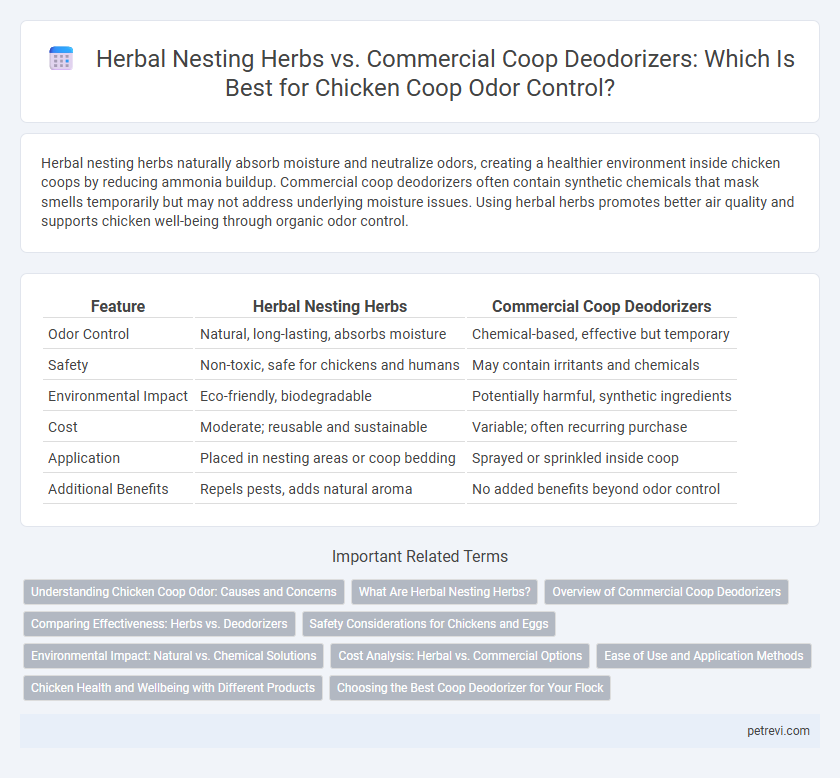Herbal nesting herbs naturally absorb moisture and neutralize odors, creating a healthier environment inside chicken coops by reducing ammonia buildup. Commercial coop deodorizers often contain synthetic chemicals that mask smells temporarily but may not address underlying moisture issues. Using herbal herbs promotes better air quality and supports chicken well-being through organic odor control.
Table of Comparison
| Feature | Herbal Nesting Herbs | Commercial Coop Deodorizers |
|---|---|---|
| Odor Control | Natural, long-lasting, absorbs moisture | Chemical-based, effective but temporary |
| Safety | Non-toxic, safe for chickens and humans | May contain irritants and chemicals |
| Environmental Impact | Eco-friendly, biodegradable | Potentially harmful, synthetic ingredients |
| Cost | Moderate; reusable and sustainable | Variable; often recurring purchase |
| Application | Placed in nesting areas or coop bedding | Sprayed or sprinkled inside coop |
| Additional Benefits | Repels pests, adds natural aroma | No added benefits beyond odor control |
Understanding Chicken Coop Odor: Causes and Concerns
Chicken coop odor primarily arises from ammonia buildup due to chicken waste and moisture, creating an environment conducive to harmful bacteria and respiratory issues. Herbal nesting herbs such as lavender, thyme, and mint naturally absorb moisture and emit pleasant aromas, reducing harmful ammonia levels without toxic chemicals. Commercial coop deodorizers often contain synthetic fragrances and chemicals that mask odors temporarily but may introduce allergens or irritants harmful to chickens and humans.
What Are Herbal Nesting Herbs?
Herbal nesting herbs are a blend of natural plants such as lavender, thyme, and rosemary used inside chicken coops to reduce odors and promote hen health. These herbs contain essential oils with antibacterial and antifungal properties, which naturally neutralize ammonia and moisture buildup from chicken droppings. Unlike commercial coop deodorizers, herbal nesting herbs offer a sustainable, chemical-free solution that enhances the overall wellbeing of poultry by repelling parasites and improving air quality.
Overview of Commercial Coop Deodorizers
Commercial coop deodorizers typically contain chemical compounds such as activated charcoal, zeolite, or enzymatic agents designed to neutralize ammonia and other odors in chicken coops. These products provide immediate odor control by absorbing moisture and breaking down waste-related smells, often requiring regular application to maintain effectiveness. While their convenience and quick action appeal to many chicken keepers, concerns about chemical residues and environmental impact have prompted some to seek natural alternatives.
Comparing Effectiveness: Herbs vs. Deodorizers
Herbal nesting herbs such as lavender, rosemary, and thyme naturally absorb moisture and emit pleasant aromas, effectively reducing odors in chicken coops without introducing chemicals. Commercial coop deodorizers often contain artificial fragrances and chemical agents designed to mask or neutralize smells quickly but may not address the root causes of odor buildup. Studies show that while commercial deodorizers provide immediate odor control, herbal nesting herbs offer sustainable, eco-friendly odor management with added benefits for chicken health and stress reduction.
Safety Considerations for Chickens and Eggs
Herbal nesting herbs such as lavender, rosemary, and thyme offer natural antimicrobial properties that enhance coop air quality without introducing harmful chemicals, ensuring a safer environment for chickens and their eggs. Commercial coop deodorizers often contain synthetic fragrances and volatile organic compounds (VOCs) that may pose respiratory risks and contaminate eggs through absorption or inhalation. Prioritizing herbal alternatives minimizes exposure to toxic substances, promoting healthier poultry and preserving egg safety for consumption.
Environmental Impact: Natural vs. Chemical Solutions
Herbal nesting herbs such as lavender, thyme, and rosemary naturally neutralize chicken coop odors through their antimicrobial properties, promoting a healthier environment without introducing harmful chemicals. In contrast, commercial coop deodorizers often contain synthetic compounds that can linger in the air and soil, posing risks to both poultry health and surrounding ecosystems. Choosing herbal solutions reduces environmental contamination and supports sustainable poultry management by minimizing chemical runoff and preserving beneficial microorganisms.
Cost Analysis: Herbal vs. Commercial Options
Herbal nesting herbs can reduce chicken coop odors naturally, often costing less over time due to their multi-purpose use as bedding and pest deterrents, averaging $10-$15 per pound. Commercial coop deodorizers provide immediate odor neutralization but typically require frequent reapplication, with prices ranging from $20-$35 per container. Evaluating long-term expenses reveals herbal options as more cost-effective, especially when considering environmental benefits and reduced chemical exposure.
Ease of Use and Application Methods
Herbal nesting herbs, such as lavender, rosemary, and thyme, offer a natural and easy method to control chicken coop odors by simply placing bundles or sachets within nesting boxes. Commercial coop deodorizers typically require spraying or sprinkling, which can involve more frequent application and careful dosing to avoid residue buildup. The hands-off approach of herbal herbs provides a low-maintenance, gentle alternative that integrates seamlessly into daily chicken care routines.
Chicken Health and Wellbeing with Different Products
Herbal nesting herbs like lavender, rosemary, and thyme naturally reduce ammonia and bacteria in chicken coops, promoting respiratory health and reducing stress in chickens. Commercial coop deodorizers often contain artificial fragrances and chemicals that may mask odors but can irritate chicken respiratory systems and disrupt their natural behaviors. Using herbal nesting herbs supports a healthier, toxin-free environment, enhancing overall chicken wellbeing and egg quality.
Choosing the Best Coop Deodorizer for Your Flock
Herbal nesting herbs like lavender, thyme, and rosemary naturally absorb moisture and inhibit bacteria, creating a fresh environment that benefits chicken health and reduces odors without harsh chemicals. Commercial coop deodorizers often use strong synthetic fragrances and absorbents like zeolite or activated charcoal, providing quick odor control but potentially introducing unwanted toxins into the flock's habitat. Selecting the best coop deodorizer depends on balancing natural antimicrobial properties and safe, effective odor neutralization to maintain a healthy, pleasant-smelling chicken coop.
Herbal Nesting Herbs vs Commercial Coop Deodorizers for Chicken Coop Smell Infographic

 petrevi.com
petrevi.com